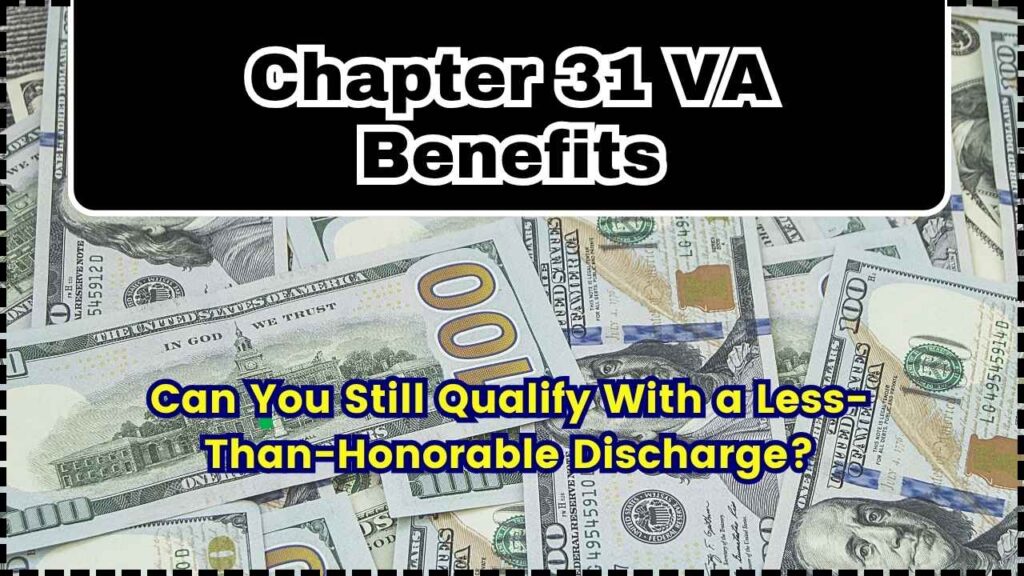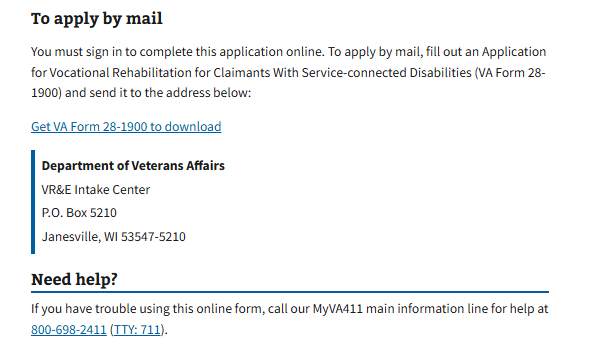
Chapter 31 VA Benefits: When veterans think about their benefits, especially Chapter 31 VA Benefits, there’s often one big question that looms over them: “Can I still qualify for VA benefits with a less-than-honorable discharge?” It’s a question that many service members face, and it’s not always easy to understand the nuances involved. The good news is that yes, you might still be able to access these vital services, even if your discharge wasn’t “honorable.” Let’s dive deep into what this means and how you can still get the support you deserve.
Veterans, regardless of their discharge status, have earned benefits from their service to our country. However, the rules around eligibility for these benefits, particularly Chapter 31, can sometimes feel like a maze. Chapter 31 specifically focuses on Veteran Readiness and Employment (VR&E) benefits, which aim to help veterans with service-connected disabilities prepare for, find, and maintain employment. These benefits can be life-changing, providing education, job training, and vocational counseling. In this article, we’ll explore how veterans with less-than-honorable discharges can still qualify for Chapter 31 VA benefits, what steps they can take to apply, and what options are available to improve their eligibility status.
Chapter 31 VA Benefits
It’s clear that a less-than-honorable discharge doesn’t necessarily shut the door on Chapter 31 VA benefits. With the right steps, such as requesting a Character of Discharge review or seeking a discharge upgrade, you may still be able to access vital support. Whether you’re interested in vocational training, job search help, or starting a new career, the VA’s services can be a lifeline for many veterans. To ensure that you understand the full process and maximize your chances of success, it’s always a good idea to connect with veterans’ service organizations or advocates who can provide guidance.
| Key Data/Insight | Details |
|---|---|
| Eligibility with Less-Than-Honorable Discharge | Veterans with a less-than-honorable discharge may still qualify for Chapter 31 benefits, depending on the specifics of their case. |
| Important Discharge Conditions | Discharge types like General (Under Honorable Conditions) and Other Than Honorable (OTH) may still allow for access to benefits after review. |
| Time Limits for Chapter 31 | Eligibility can last up to 12 years after discharge, but it can also extend indefinitely if discharged after January 1, 2013. |
| Character of Discharge Review | Veterans can request a Character of Discharge review to determine if their service qualifies them for VA benefits. |
| Application Steps | Apply online via the VA’s website, and include a request for a Character of Discharge review if needed. |
What is Chapter 31 VA Benefits?
Chapter 31 is a specific program that falls under the Veterans Benefits Administration (VBA). It’s designed to assist veterans with service-connected disabilities in transitioning back into civilian life through support like:
- Vocational counseling to help determine your best career options based on your skills and interests.
- Training and education programs, including tuition for college or vocational schools.
- Job search assistance and help finding suitable employment.
- Support for self-employment or starting your own business.
- Workplace accommodations if you have a disability.
Chapter 31 benefits are a game-changer for many veterans, giving them a chance to rebuild their careers and live fulfilling lives after service. But, qualifying for these benefits requires meeting specific eligibility criteria, including discharge status and disability rating.
Can You Qualify with a Less-Than-Honorable Discharge?
Here’s the thing: while a less-than-honorable discharge complicates matters, it doesn’t automatically disqualify you from receiving Chapter 31 benefits. The key word here is “conditions.” The VA looks at the character of your discharge when determining your eligibility. If your discharge was less-than-honorable but not dishonorable, there’s still hope.
Types of Discharges That May Qualify
- Honorable: The best of the best, no questions asked – you’re definitely eligible for VA benefits, including Chapter 31.
- General (Under Honorable Conditions): This is a middle ground discharge. It’s not perfect, but many veterans with this status can still access benefits.
- Other Than Honorable (OTH): Veterans with this discharge might still be able to get Chapter 31 benefits, but the VA will need to review your case carefully.
- Bad Conduct Discharge (BCD): This is the worst-case scenario, and typically doesn’t qualify you for VA benefits. However, in certain situations, you may still be able to get your discharge reviewed.
What’s the Process for Less-Than-Honorable Discharge Veterans?
If you have a less-than-honorable discharge and want to qualify for Chapter 31 benefits, here are your options:
- Character of Discharge Review: If your discharge was less-than-honorable, the first step is to apply for a Character of Discharge review. The VA will look at the circumstances surrounding your discharge. They’ll ask questions like:
- Why were you discharged?
- Were there extenuating circumstances (e.g., personal hardship, mental health struggles)?
- Did you serve honorably in most of your time in the military?
- Discharge Upgrade: If your Character of Discharge review doesn’t go in your favor, you can request a discharge upgrade through your branch’s Discharge Review Board (DRB). If granted, your discharge status could be changed to honorable, making you fully eligible for Chapter 31 benefits.
- Consult a Veterans’ Advocate: A veterans’ service organization or advocate can help guide you through this process and ensure all the necessary paperwork is filed correctly.
How to Apply for Chapter 31 VA Benefits?
If you meet the eligibility requirements, applying for Chapter 31 benefits is relatively straightforward. Here’s a simple guide to help you through the process:
Step 1: Gather Your Documents
Before starting the application, make sure you have the following:
- Your DD-214 form (this shows your discharge status).
- Proof of disability from the VA (your service-connected disability rating).
- Any additional paperwork related to your military service and discharge status.
Step 2: Apply Online or In Person
You can submit your application through the VA’s online portal here. Alternatively, you can visit your local VA office or veterans service organization for assistance.
Step 3: Request a Character of Discharge Review (if applicable)
If you have a less-than-honorable discharge, make sure to request a Character of Discharge review during your application process. This will allow the VA to evaluate your case and determine whether you qualify for Chapter 31 benefits.
Step 4: Wait for the VA’s Decision
After you’ve submitted your application, the VA will review your case. If they approve your eligibility, you’ll receive a notification and can begin using your benefits.
Step 5: Start Your Benefits
Once approved, you’ll have access to a range of resources like vocational counseling, job training, and educational support.

Real-Life Examples
One veteran, let’s call him John, served in the Army and received a General (Under Honorable Conditions) discharge after facing personal struggles during his service. He was unsure if he could qualify for Chapter 31 benefits, but with the help of a veteran advocate, he applied for a Character of Discharge review. The VA reviewed his case, considering his service and the reasons behind his discharge. John was eventually approved for Chapter 31 benefits and began receiving vocational training to pursue a new career in cybersecurity.
Similarly, Sarah, a Navy veteran with an Other Than Honorable (OTH) discharge, faced barriers when trying to access Chapter 31. She didn’t give up and applied for a discharge upgrade through the Discharge Review Board. Her upgrade was granted, and she now works in a field she loves thanks to the support she received through Chapter 31.
Challenges and Common Pitfalls
Navigating the Chapter 31 application process can be overwhelming, especially with a less-than-honorable discharge. Some common challenges include:
- Delays in Discharge Reviews: Veterans may experience long waiting periods for discharge reviews or upgrades.
- Complex Documentation: Gathering the required documentation, including service records and medical files, can be difficult, especially for veterans who left the military years ago.
- Denial of Benefits: If the VA denies benefits, veterans may feel discouraged. However, appeals are an option, and many veterans successfully reverse initial decisions.
Overcoming These Challenges
- Be patient: Understand that these processes take time. Stay persistent and proactive.
- Seek support: Veterans’ service organizations (VSOs) are there to help. They can guide you through each step and increase your chances of success.
- Keep records organized: Ensure all documents, from your DD-214 to medical records, are in order and easy to access.
VA Disability Payments 2025: Exact Dates & New Monthly Amounts Revealed!
June 2025 VA Benefits Boost: How Much Extra Will You See in Your Deposit?
Chapter 35 VA Benefits: When Your June 2025 Check Will Arrive—Full Payment Schedule Inside
Long-Term Support Options
Once you qualify for Chapter 31 benefits, it’s important to remember that the VA offers ongoing support. Even after you’ve completed your vocational training or educational goals, the VA continues to assist veterans in maintaining employment and adapting to career changes.
Many veterans find that they need ongoing support as they transition back into civilian life. Veteran employment specialists and VA counselors are available to provide continued guidance throughout your career. Additionally, veterans with service-connected disabilities may be eligible for ongoing disability compensation and other long-term support services.











